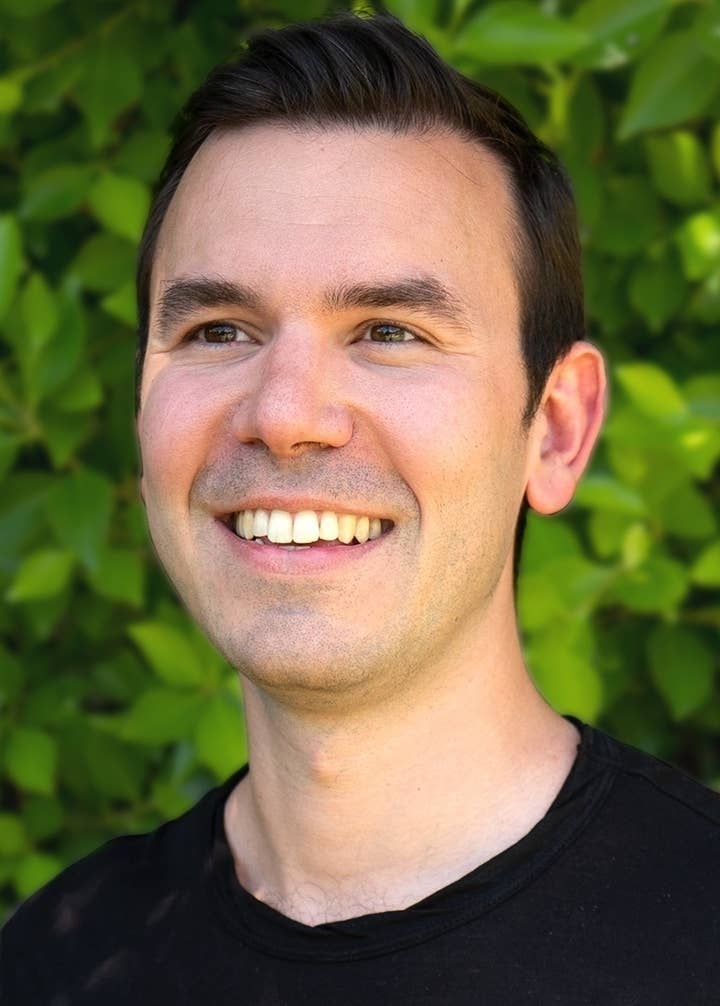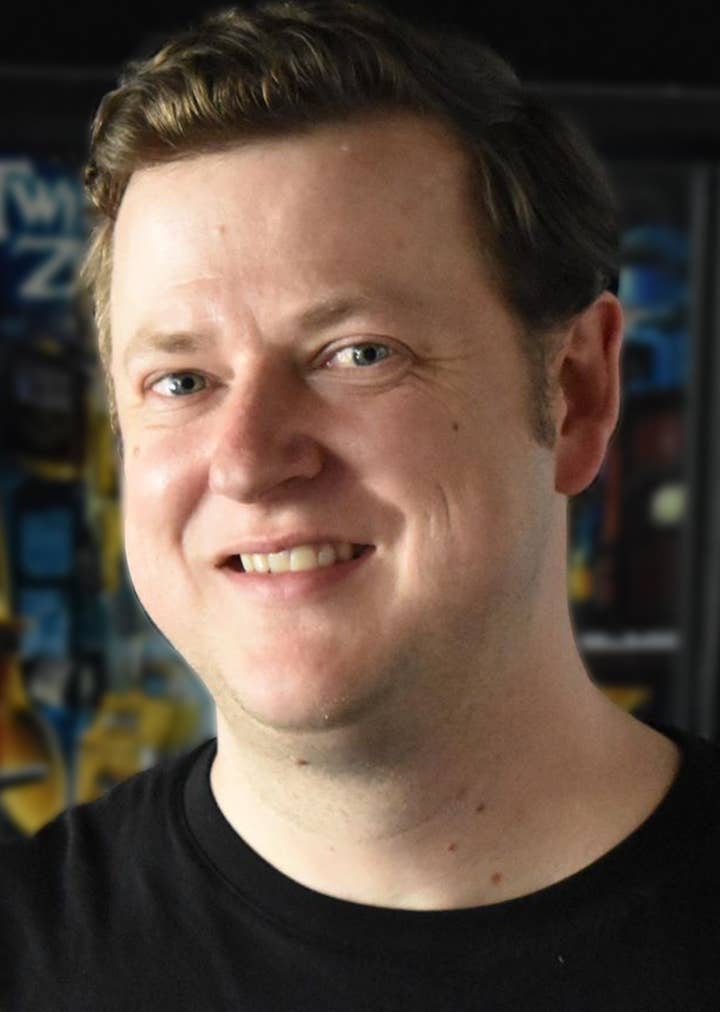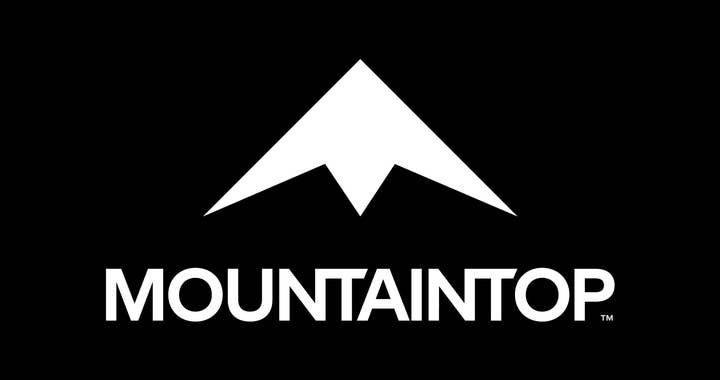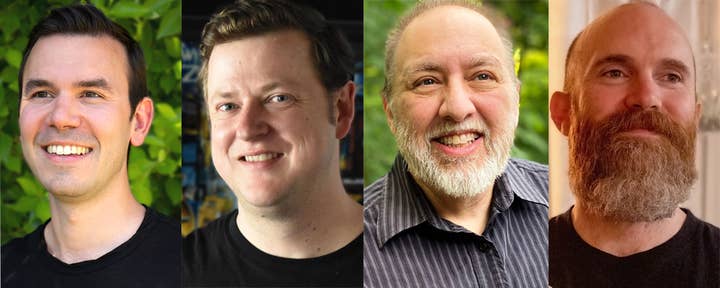Oculus vets size up challenge facing their new studio Mountaintop
Nate Mitchell and Matt Hansen on anti-crunch, their multiplayer ambitions, and establishing a company culture without a central office
Oculus co-founder Nate Mitchell and former colleague Matt Hansen have launched a new studio, GamesIndustry.biz can reveal.
The duo has already recruited staff who previously worked at Naughty Dog, Epic Games, Respawn, Double Fine, Hidden Path and Ensemble to form the initial team at the newly-opened Mountaintop Studios.
Among the founding members is Richard Lyons, most recently concept artist on The Last Of Us Part 2, and Mark Terrano, who left his position as a creative director at Facebook.
There are no details on the first game from Mountaintop, but Mitchell tells us the studio's core focus is on "building multiplayer games that create a challenge."

"Games have this incredible power to bring people together," he says. "There is something special about when a team overcomes what seems like an insurmountable challenge, how that feels and how that transforms them. That's a big part of the heart of the type of games we want to make -- but that's all we've got to share just yet."
It's likely Mountaintop's debut title will be a service-based multiplayer affair as Mitchell describes the concept as something he and Hansen want to "spend the next few decades working on together."
The only other insight into the game is Mitchell's reference to his recent experiences with escape rooms, and how these present a difficult set of puzzles but groups with different strengths and abilities can overcome them together.
"When we look at the games industry, we don't think there are enough games out there that fit with that spiritually," he says. "Something really challenging for a team to have to come together and grow to overcome and accomplish what seems impossible. We're drawing on a lot of different genres, a lot of inspirational pieces."
He also stresses that while job listings for the new company ask for knowledge of console and PC development, "that's just a baseline we're looking for."
Mountaintop will be a "remote-first" studio, meaning that while the company currently has no physical premises, Mitchell and Hansen hope to establish them in future.
"Matt and I agonised over what could be the location of the studio versus going remote," Mitchell explains. "We were very close to going [fully] remote but we heard the value of having a studio for remote teams, somewhere people can get together. If people can't work at home for any reason, or don't want to, they can still be a part of this studio."
"Our goal shouldn't be hiring people quickly, because that's when you end up hiring a bunch more white dudes"
Matt Hansen, Mountaintop Studios
The pair were very close to securing an office space in Los Angeles earlier this year, but "that plan was quickly blown up by COVID."
Now the plan is to open an office at a later date -- still likely in Los Angeles, but this may change depending on how far the final team is spread. The physical studio is expected to be smaller and "unlikely to be a HQ," but will give team members somewhere to work if they choose and a central place for the team to fly in and meet together.
"It also means we can get the best talent from anywhere in the world," he said. "Otherwise that team would not be able to come together and create something this special."
Mitchell and Hansen previously spent several years working together at Oculus, defining the virtual reality device's hardware, software, app store, developer tools and more. While games were a part of Oculus, the duo often speculated what they would do if they returned solely to games devleopment. Mitchell left Oculus last August and began working on new game concepts.
One particular idea excited him, and he began discussing it with Hansen back in January. By spring, the two had agreed to form Mountaintop Studios and work on this project together.
"I really wanted to get back into games," Hansen explains. "I knew that's where my heart really was, the happiest days of my career have always been making games with small creative teams."
Mountaintop is currently recruiting with the aim of reaching a headcount of 50. While the pair don't rule out growing beyond that, Hansen said his experiences at both Oculus and Double Fine showed that the dynamics of a studio change significantly once you pass around 60 people.

"There's not enough room at the lunch table," he says. "You walk by people in the hallway and you don't always know who they are. That's when you're like, 'Wait, this doesn't feel like it did when we were smaller.'
"Having the luxury of being small is great. We can focus on the design, the meta, all the fundamentals and we don't have a huge content team waiting in the wing going, 'I can't wait to start making art.'"
Company culture is a different challenge when the entire team is working remotely, of course. There are no water cooler moments, no way to chat to people in the hallway. But Mountaintop draws on some of the practices used by Oculus, such as Facebook's Workplace platform to connect team members in as many ways as possible.
The internal message board has been used to discuss with the entire team what the culture should be, and new voices have the opportunity to contribute when they job. There are also references and resources around the studio's core values, as well as inspirational images and quotes that resonate with the co-founders.
"It's all these little details that normally a company would be able to leverage sitting in the room together or maybe putting a poster on the wall," says Mitchell. "Instead, we have to move that to a virtual office. I think it's actually been pretty successful so far."
As they hire, Hansen and Mitchell both describe building a diverse team as "one of our top priorities" -- especially in light of the most recent Black Lives Matter movement. Even the blog post announcing the new studio addresses this at the very beginning.
This was already a central pillar of building the new studio, but these recent events have cemented the co-founders determination to bring in as many voices as possible. Having a smaller team might also help ensure these voices are not drowned out.
"The best ideas can come from anywhere and anyone, and with a small team you can really make sure all that stuff gets heard and considered," says Mitchell: "Again, being remote-first allows us to do this in a way that we wouldn't if we were just based in, say, San Francisco."
Of course, it's easy to say you're going to build a diverse team but when the founding members of a new studio are four white men, there will be skeptics. Hansen adds that Mountaintop is not about to rush its recruitment drive, either, because hiring diverse teams is difficult and takes time.
"The best ideas can come from anywhere and anyone, and with a small team you can really make sure all that stuff gets heard and considered"
Nate Mitchell, Mountaintop Studios
"Our goal shouldn't be hiring people quickly, because that's when you end up hiring a bunch more white dudes," he says. "It's about slowing down our hiring so that we're interviewing as many people as possible from different diverse backgrounds. That worked really well for us at Oculus as well. Even if we have goals to hire X amount of people, the ultimate goal should be hiring enough people from different backgrounds."
The recent wave of allegations concerning abuse, bullying and harassment across the industry has also added to Mountaintop's considerations when establishing its team. All companies should now be revisiting how they protect staff, but that's both easier and harder to do when your studio is remote. On the one hand, developers won't be physically surrounded by a toxic work environment, but on the other, it's hard for management to see how team members are interacting in private chats.
"We have zero tolerance for bullying or harassment, internally or externally," Mitchell stresses. "Another thing that's important, and this is something I really believe, is that culture starts at the top. Matt and I feel responsible for making sure we're driving the right culture that has zero tolerance for harassment, racism and so on. That starts with us, and we come in every day and focus on how we can make sure that's happening.
"Matt and I want to set this up right from the very beginning so we don't find ourselves in a situation where our employees are responsible for anything like that down the road."

Both Hansen and Mitchell had been working on the company's harassment policy just two weeks ago. It was almost ready to be shown to the team when the first allegations emerged, but the two used that as an opportunity to discuss what was happening and emphasise the company's stance on such behaviour.
"Frankly, we should have had the harassment policy already in place by then, but it was good to say, 'Hey, we were editing this just the day before, and we're going to get it ready for everyone to sign, and new people are going to sign it too,'" says Mitchell.
He added that anti-harassment policies are also important for any studio because if you create a culture where people feel safe and like they belong, they're more likely to produce their best work.
"I knew that's where my heart really was, the happiest days of my career have always been making games with small creative teams"
Matt Hansen, Mountaintop Studios
"Getting everyone to do their best work -- regardless of where they come from, regardless of their background or whether they're an introvert or extrovert, a man, a woman or otherwise -- it's about creating a space where everyone can come every day and bring their best to the table to create something super special," he says.
"Games are really a reflection of the teams that make them. A team that works well together, has a lot of fun and has a deep sense of trust, respect and belonging, they're going to create something that's out of this world."
In addition to building a diverse team, Mountaintop is working on finalising the concept for its first game. While there are no details on when they hope to release, the timeline for its development is "pretty aggressive but we think it's totally doable."
That said, both Hansen and Mitchell emphasise that the studio is anti-crunch. The scope of the game is "very focused" and there are already plans for what content can be cut or where people can be added should this timeline look unrealistic.
"Where some teams get in trouble is they try to predict what the next three years looks like for them but they don't have any way of evaluating the scope as they go or their trajectory on a reasonable timeline so things ultimately get squished towards the end," says Hansen. "We want to be very focused so if we produce new work, new features or whatever, we're really aware of what the overall impact is on our schedule -- rather than saying, 'Let's get more work done in the same amount of time,' which is ultimately going to lead to crunch."
Preventing or even detecting crunch can be more difficult for a remote-first studio as there's no way to be monitoring when people have stopped working, but Hansen said that -- much like the culture -- this is something that starts at the top.
"People will look to the leadership group to see what kind of behaviours they have," he said. "Are they fostering a culture of crunch by their behaviours? We really want people to come in and have a focused day of work, but at the end of the day go home to be with their friends and family. And we've found there's a certain point of diminishing returns after eight hours of work, so we want people to go home, recharge, and be ready for a solid day the next day.
"Even things like us sending emails after working hours -- those are the sort of things that very subtly suggest to people, 'Maybe you should be working right now? Because the founders are working right now.' We're conscious of that, I've been on the receiving end of it as well."









